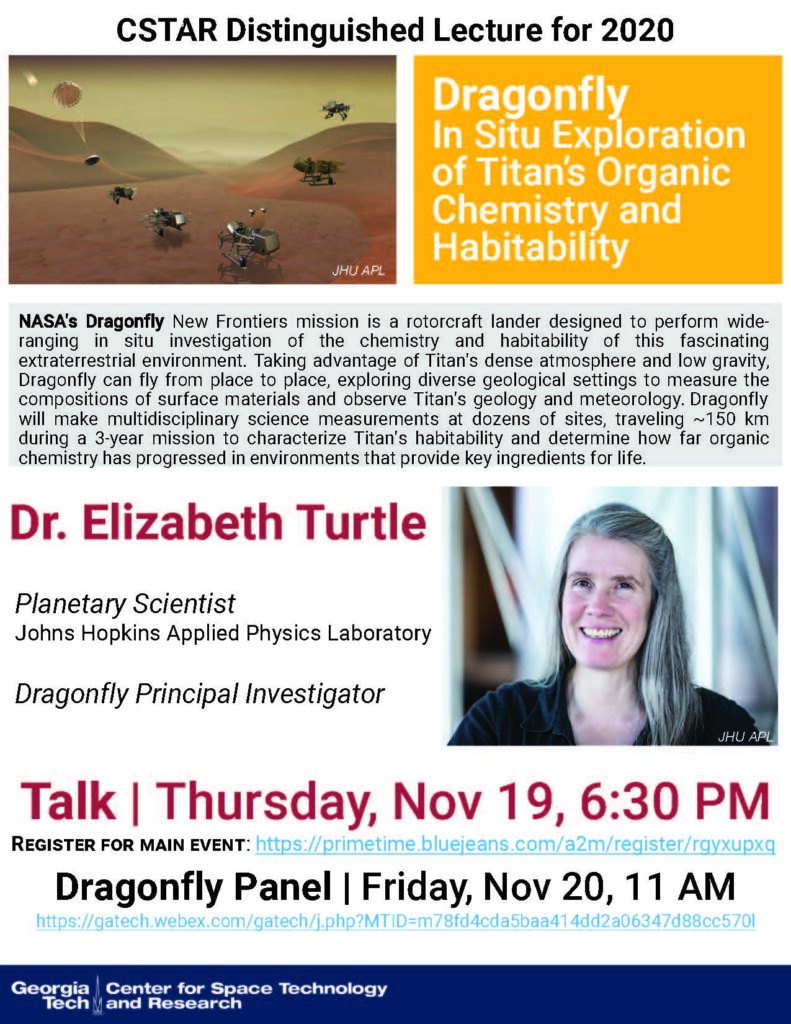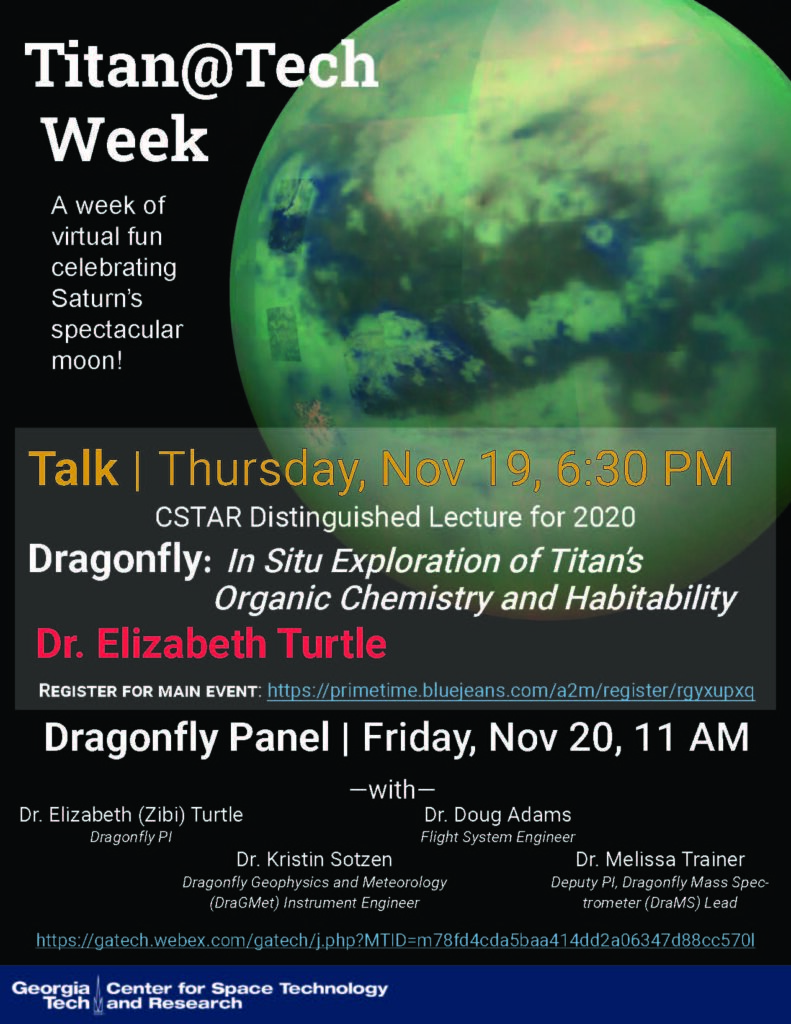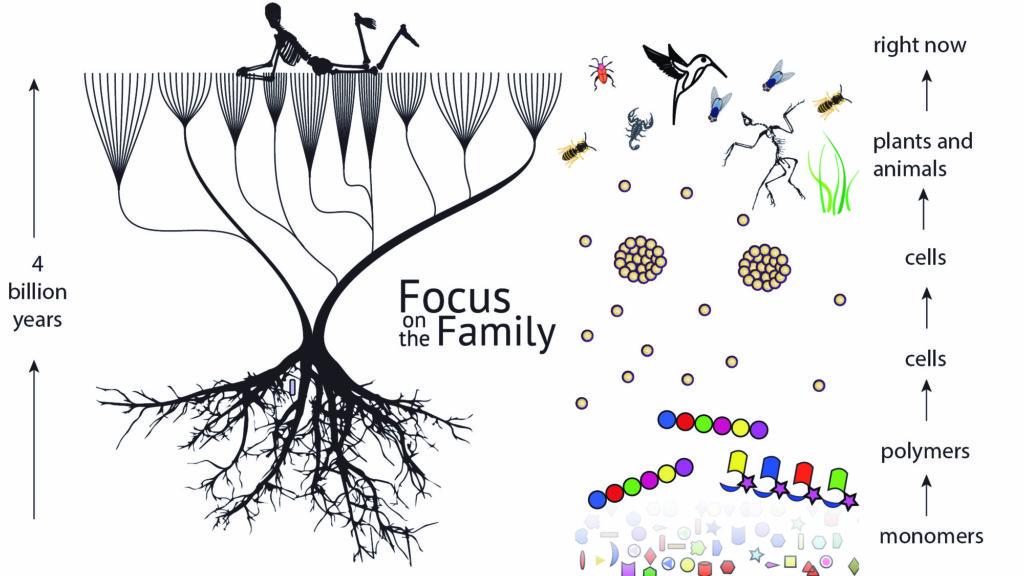A Celebration Georgia Tech Astrobiology
September 14, 2018
Past Events
11:30-2:30,
September 3, 2017
Hilton 210-211
Where do we come from? Does life exist elsewhere in the universe? While the latter may seem like the stuff of 21
st century science fiction, both questions have been integral to myriad cultures for millennia. Over the last decades however, research the life and physical sciences has brought these inquiries into the realm of science, and given rise to the field of astrobiology. But what do we know about our origins? And how do we search for life? The first part of this interactive symposium will introduce current scientific thought on the beginnings of our biochemistry, the evolution of our planet as a habitable system, and how we search for signs of life in space. The second half will explore the mutually influential roles science and science fiction, the implications of the discovery of water on Mars, and what life might look like on worlds far different than our own. Audience members are encouraged to come curious and ready with questions about the science and its place in our broader human context.
September 23, 2017
Among the oldest questions conceived by humans are: What is the origin of life, and does life exist on other worlds? Georgia Tech will host a day-long public Symposium on Astrobiology and Society in Fall 2017 with sessions dedicated respectively to Origin and Evolution of Life on Earth and The Search for Life Beyond our Home Planet. Each session will be rounded out by a half-hour discussion led by a panel of distinguished scientists and humanists. Anticipating discoveries that will alter our very concept of life, astrobiology pushes us to reflect upon the meaning of “creation”, our place in it, and how to accommodate scientifically plausible alternatives to longstanding hypotheses and myths. While astrobiology is often presented to the public as ‘other worldly’, and can easily carry utopian visions of possibility and hope, the force of astrobiology is first and foremost terrestrial. The aura of new worlds reminds us that our cosmic ‘other worldly discoveries’ above all concern the planet on which we live. Analysis of data from vent plumes in our solar system or in Pacific Ocean trenches show the ways our solar system has become a laboratory for better understanding our own planet. The symposium and related interviews with participants will be recorded and provide substrate for a documentary that focuses on how astrobiology drives research across science and the humanities, and sparks open and imaginative discussion about Big Questions, including, What is life? What is the value of different life forms? What is humankind’s destiny?
Register Here
The Hidden Lives of Microbes in the Wild and How They Transform Our Planet
Nadia Szeinbaum, Potdoctoral Researcher, Earth and Atmospheric Sciences
September 23, 7:00-9:00
Manuel’s Tavern
We know that life began with single-celled microorganisms which, in contrast to us, remained unicellular, and “primitive.” Most of us are familiar with microbes in our daily lives, both in a good way (yogurt, yay!) or a bad way (cavities, boo!). However, most microbes aren’t so domestic; they live in the wild, and have intriguing lifestyles that affect our existence at a global scale. These cells, though minuscule, are major contributors to the living world on Earth. Because they are ancient, they also retain secrets about life on Earth before we showed up.
In this presentation, Georgia Tech postdoctoral fellow, Nadia Szeinbaum, will discuss these invisible giants and share with us what she has found out while investigating them in the lab.
RSVP Here
9:30 am – 5:30 pm
February 17, 2018
Candler School of Theology at Emory University,
1531 Dickey Drive, Atlanta, GA 30322
This full-day event was organized in partnership with the Leadership and Multifaith Program and is co-sponsored by Columbia Theological Seminary. The symposium aims to generate a multifaith discussion among scholars, clergy, community leaders, and students about science, spirituality, and the future of life on earth and elsewhere. Speakers will address this theme from diverse disciplinary perspectives, including cognitive science, religious studies, ecology, ecotheology, ethics, and astrobiology. The symposium will be held on February 17, 2018, at the Candler School of Theology at Emory University, located at 1531 Dickey Drive, Atlanta, GA 30322. Lunch is included, and a short reception will follow the final session. This event is free and open to the public. Registration is required.
More details
3:00-4:00, 6:00-7:00
March 11, 2018
The Space,
4620-A S Atlanta Rd SE, Atlanta, GA 30339
Georgia Tech Astrobiology is collaborating with, The Hereafter Artist Collective, andFlight of Swallows to bring performance art to the Atlanta Science Festival. Forty years ago, Carl Sagan arranged to send The Golden Record into space as a part of the Voyager Mission. The Golden Record, two phonograph records full of sounds and images, serves as a time capsule for future life forms to one day look back upon our existence. Under the direction of the Hereafter Artist Collective, this performance piece incorporates aerial arts, modern dance, and live music to explore the themes of this “time capsule” and how humanity may appear to those lifeforms. Will humanity be but a fairytale and The Golden Record just a beautiful moment when we reached to the stars looking to “join a community of galactic civilizations”?
CRA Distinguished Lecture: The Case for Cosmic Modesty
Abraham “Avi” Loeb
Chair of the Astronomy Department, Founding Director of the Black Hole Initiative, Director of the Institute for Theory and Computation, Harvard University
March 12, 2018, 6-7 PM
Clough Undergraduate Learning Commons, Room 152
266 4th St. NW, Atlanta, GA 30313
Based on the premise that we are not special, Loeb argues for modesty from a cosmic perspective. His “principle of cosmic modesty” implies that both primitive and intelligent forms of life should exist away from Earth, and we should therefore search for them without prejudice.
Abraham (Avi) Loeb Chair of the Astronomy Department Founding Director of the Black HoleInitiative, Director of the Institute for Theory and Computation, Harvard University CRA Distinguished Lecture The Case for Cosmic Modesty Abraham (Avi) Loeb is the Frank B. Baird Jr. Professor of Science at Harvard University. He published nearly 600 papers and 4 books which pioneered several new frontiers in astrophysics and cosmology. Loeb serves as Chair of the Department of Astronomy at Harvard University, Founding Director of Harvard’s Black Hole Initiative and Director of the Institute for Theory and Computation (ITC) . He also chairs the Advisory Committee for the Breakthrough Starshot Initiative, and serves as Vice Chair of the Board on Physics and Astronomy of the National Academies. He is an elected fellow of the American Academy of Arts & Sciences, the American Physical Society, and the International Academy of Astronautics. In 2012, TIME magazine selected Loeb as one of the 25 most influential people in space
Talking science with your grandma, your neighbor, or a Fox News Pundit!
Jon Perry
Animator and Founder of Stated Clearly
Georgia Tech Molecular Sciences and Engineering Building
Wednesday, March 21; 2:00-3:30
Join Georgia Tech Astrobiology and Jon Perry for an interactive workshop on how scientists can practicably and understandably communicate with members of different publics.
Br. Guy Consolmagno
Director of the Vatican Observatory, Rome
Where: Georgia Tech TSRB Building Auditorium (Technology Square: 85 5th Street, NW @ Spring and 5th)
When: Thursday, April 12, 2018 at 7:00 pm
Why did we go to the Moon? Why does the Vatican support an astronomical observatory? These questions mask a deeper question: why do individuals choose to spend their lives in pursuit of pure knowledge? The motivation behind our choices, both as individuals and as a society, controls the sorts of science that gets done. It determines the kinds of answers that are found to be satisfying. And ultimately, it affects the way in which we think of ourselves.
Read more here
June 4-8, 2018
Atlanta, GA
[youtube https://www.youtube.com/watch?v=sVaYVLKlWZs&w=560&h=315]
See the preliminary schedule here.
Why on Earth?
September 3, 2018, 1:00
Dragon Con
How did we get here? Is there life elsewhere? Can we know it? Panelists from prebiotic chemistry, life detection, exoplanet discovery, planetary evolution, and more discuss how we’re learning where we came from, where else life might be, and how we might discover and communicate with it.
Mon 1:00 pm; 210—211 [Hil]




